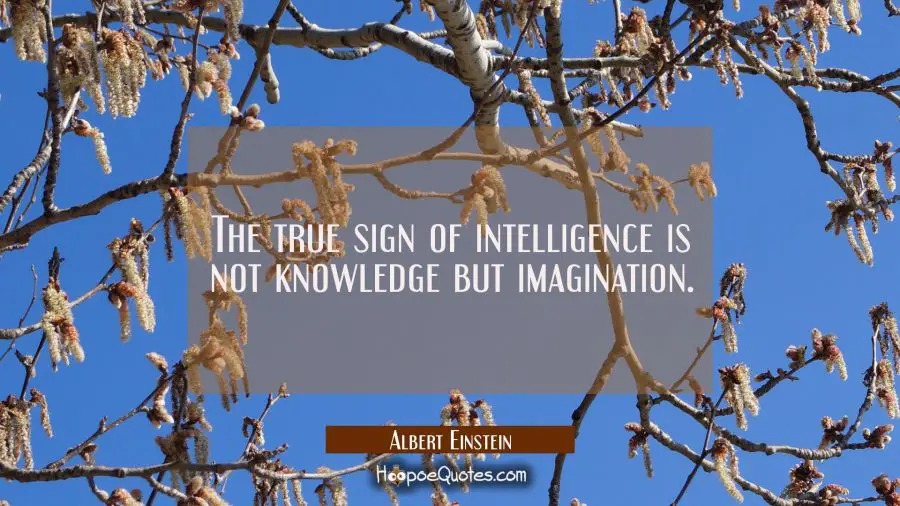Disclosure: This post may contain affiliate links, meaning we get a commission if you decide to make a purchase through our links, at no cost to you.
The Holy Grail of Intelligence
Alright, let’s kick things off with a bang. Imagine a world where everyone thinks knowledge is the holy grail of intelligence. Spoiler alert: they'd all be wrong. Enter Albert Einstein, the mad genius who didn't just revolutionize physics but also how we perceive intelligence.

Albert Einstein, the wild-haired physicist who cracked the code of the universe with his theory of relativity, didn't just stop at E=mc². He had a knack for dropping truth bombs that still resonate today. Take this gem, for example: "The true sign of intelligence is not knowledge but imagination." Whoa, that hits hard, doesn’t it? This quote smashes the conventional wisdom that being a smarty-pants is all about cramming facts. It's all about dreaming up wild, new ideas.
In this article, we're diving deep into this Einsteinian wisdom, breaking it down, and showing you why it still matters today. Buckle up!
Decoding the Quote
Albert Einstein wasn’t your average know-it-all. He was a visionary who saw beyond the surface. When he said, "The true sign of intelligence is not knowledge but imagination," he was essentially flipping the bird to the old-school idea that intelligence is just about knowing a lot of stuff. Instead, he highlighted the importance of creativity and innovation.
- Knowledge: It's about the facts and figures. The stuff you memorize for your exams.
- Imagination: It's the ability to dream, create, and innovate. It's about thinking outside the box.
Einstein’s quote suggests that while knowledge is important, it's imagination that truly drives progress. Knowledge is limited to what we currently know and understand, while imagination embraces possibilities, dreams, and innovations.

Contextual Background
Einstein wasn’t exactly a poster child for conventional education. He struggled in school, often clashing with teachers who couldn't see beyond the rigid curriculum. His life and career were a testament to thinking differently. His theories weren’t just based on existing knowledge but on his ability to imagine the universe in ways no one else had.
Historical Examples
Throughout history, game-changers like Leonardo da Vinci and Steve Jobs weren’t just knowledgeable—they were imaginative. They saw the world not as it was, but as it could be. Da Vinci imagined flying machines centuries before the Wright brothers took to the skies. Jobs imagined a world where technology was intuitive and personal.
Philosophical Principles
Philosophers have long debated the essence of intelligence. Plato considered knowledge as key to wisdom, but later thinkers like Kant and Nietzsche pushed for the value of creativity and imagination. Nietzsche, with his idea of the Übermensch, celebrated those who could imagine new values and ideas.

Psychological and Sociological Viewpoints
Psychologically, imagination is linked to creativity, problem-solving, and emotional intelligence. It's what allows us to empathize with others, create art, and develop new technologies. Sociologically, societies that foster imagination and creativity tend to be more innovative and adaptable.
Cultural Impact
Einstein’s quote has permeated popular culture. From movies to motivational speeches, it's a reminder that true intelligence isn't just about rote learning but about pushing boundaries. Think of how this quote has inspired countless innovators, artists, and thinkers to dream big.
Modern Interpretations
In today’s world, where information is just a click away, knowledge alone doesn’t cut it. The real movers and shakers are those who can imagine new solutions to old problems. Whether it's in tech, art, or social change, imagination is the driving force behind innovation.
Consider the tech industry. Coding knowledge is essential, but the real breakthroughs come from those who can imagine new applications and technologies. It's the difference between being a good coder and being a visionary like Elon Musk.
In the age of AI and automation, jobs based purely on knowledge are at risk. The future belongs to those who can think creatively and adapt. Social movements, too, are driven by the ability to imagine a better world and work towards it.

My Take
Einstein's quote is a powerful reminder to nurture our imaginative side. In a world obsessed with facts and figures, it's the dreamers and visionaries who truly make a difference. Imagination fuels passion and drives us to explore the unknown.
Think about the moments when you've been at your most creative. How did it feel? What did you achieve? Now, imagine if you could harness that power more often. It's not just about thinking outside the box—it's about realizing there is no box.
Practical Integration
- Daily Creativity: Set aside time each day to brainstorm, doodle, or engage in creative activities.
- Challenge Norms: Question the status quo and think about how things could be different.
- Inspire Others: Share your imaginative ideas and encourage those around you to think creatively.
To wrap it all up, Einstein's words are a timeless reminder that true intelligence goes beyond knowledge. It's about imagination—the spark that leads to innovation and progress. As we navigate an ever-changing world, let's keep dreaming, creating, and imagining the possibilities.
References and Further Reading
- "Einstein: His Life and Universe" by Walter Isaacson
- "Creativity, Inc." by Ed Catmull
- "The Creative Habit" by Twyla Tharp
- Similar Quotes:
- “Imagination is more important than knowledge.” – Albert Einstein
- “Logic will get you from A to B. Imagination will take you everywhere.” – Albert Einstein
- “The power of imagination makes us infinite.” – John Muir
Thought Exercise
Take a moment each day to imagine a world different from the one you know. What changes? What stays the same? How can your imagination shape a better future?
Stay bold, stay imaginative, and keep pushing those boundaries!













![[50+ Images] Birthday Wishes for Someone Special in Your Life Quotes](/media/k2/items/cache/b1dbe5e313fb0e0a26b2b36062a36d3a_M.jpg)
